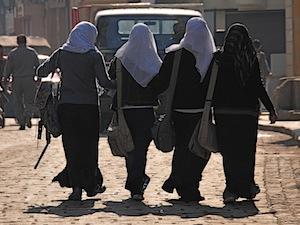HarassMap uses texting to fight sexism in Egypt
Photo of women in Egypt (Image by Ed Yourdon (cc:by-sa))
In Egypt, an estimated 80 percent of women have been sexually harassed. About half of those women are assaulted daily, according to a 2008 study by the Egyptian Center for Women's Rights. A group of young organizers are fighting back using HarassMap, a dynamic map documenting where, and how frequently, the attacks occur.
Some people, including the first lady of Egypt, Suzanne Mubarak, deny that sexual harassment is an issue in the country. Others blame women for not wearing veils. However, Nihad Al Qumsan, the director of the Egyptian Center for Women’s Rights, says the issue is real, and dress is not the source of the problem.
"When they're speaking generally, men will say that harassment is the result of women wearing provocative clothes. But when they filled out our survey, they admitted they also harass women who are veiled." Qumsan continues, "The men try to find an excuse for their behavior, but most women in Egypt are veiled. And anyway a woman is free to wear what she wants."
Eman Morsi has first-hand knowledge of the harassment. She described it to The World: "They would just brush across and that tends to be a bit intimidating, and there's also when they grope you and stuff. I think pretty much, many women went through that, but we don't really talk about it."
Organizers want women to start texting HarassMap after every attack, including the type of assault and their location in the text message. Once hotspots are identified, the map will provide information about dangerous areas. The organization will also send representatives into those areas to work with community members. One of the organizers, Rebecca Chiao explains, "The goal of our effort actually is not just to create a map. The goal is to change the social acceptability of harassment. So, the map is the first step."
The organization believes that it can reduce the shame experienced by women, and focus attention on society's responsibility. The HarassMap Executive Summary states, "Women often suffer from feeling shame, isolation, frustration and self-loathing for not having responded quickly enough. Reporting harassment by HM [HarassMap] validates women as victims of a crime committed against them and their right to safety." The organization will inform women of resources, including legal aid and self-defense classes. It will also notify the police of its findings to encourage the authorities to increase their presence in "hotspot" areas. Together, organizers hope to make Egypt a safer place for women.
We want to hear your feedback so we can keep improving our website, theworld.org. Please fill out this quick survey and let us know your thoughts (your answers will be anonymous). Thanks for your time!
